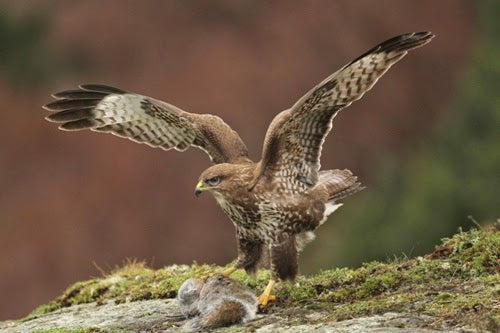
I'm often asked how long it takes me to paint a picture and the answer is complicated because I can spend a very long time in the field studying a subject in its natural habitat. I use photographic studies to paint from rather than sketches and often I will 'stage' my photographs with an eye on the eventual composition of the painting. This month I have been in Wales photographing a family of buzzards. These shots are actually the result of a two year project to get the buzzards to feed from the same spot above my parents' house in Snowdonia.
The idea was seeded even earlier than that when I began feeding some buzzards close to my gallery here in Thixendale, some years ago now. I've never been able to rely on these local birds turning up to feed consistently and have spent many hours in my hide waiting for them to show. Food is scarcer in Wales and the buzzards seem less wary of humans, which might account for my success there instead. My parents live on a mountainside and there is a large granite slab on a steep hill about 200m above their house from which you get an impressive view of Mount Snowdon. My long term plan is for a painting of a buzzard in the foreground, with the mountain peak behind.
To achieve this I hauled a twisted branch of hawthorn up there for the birds to perch on, and built a hide among some trees overlooking the granite slab. It took me six days to build the hide, carrying my tools and equipment up the steep incline. My first attempt blew over in 80mph winds a year ago - so I've had to do this twice! But now my father climbs up to the rock twice a week to take food to the buzzards and these wild birds of prey are so accustomed to feeding there they come down to the garden and begin mewing when it's time for dinner. I can recognise them at a glance now. This is the male, he is very smart with heavy markings and is the most cautious of the family group. He is always aware of my presence and often won't come in to feed when I'm in the hide.
The adult female, larger and paler than her mate, is less wary, although she too has spotted me and has even glared down my camera lens, startling at the sight of the movement of the shutter.
My favourite is their female chick, below. She has a pale eye and white fringing on her feathers. I've photographed her the most, as she has such attractive markings and is the least wary. But I'm conscious that soon the adult birds will chase her away to fend for herself.
The three birds recognise my father and appear almost on cue when he is out in the garden. But I'm yet to get the shot of them with the backdrop I'm after in the frame. Earlier this month I tried using the wide angle of a go-pro camera to capture this composition. But despite trying to camouflage the go-pro in netting, the male buzzard spotted it immediately and even the two females flew off in alarm at the sight of it. It could be a while before I get the exact image I'm after, but I'm still pleased with the success of my feeding station and the photographic studies I've got so far.
Below is a painting inspired by this research. I still plan another and am continuing to photograph the buzzards at this station when I can.












1 comentario
Its elaborated your creative process,for take your subject to paint.In my case i usually paint an animals that dont live in my área,and need to search information avout his morphology and the nature environment where they are live.And also the mental visualization its a powerful tool for draw and prepare the picture, normally i need to search information for clarefy many doubts about the specie that i want to paint.